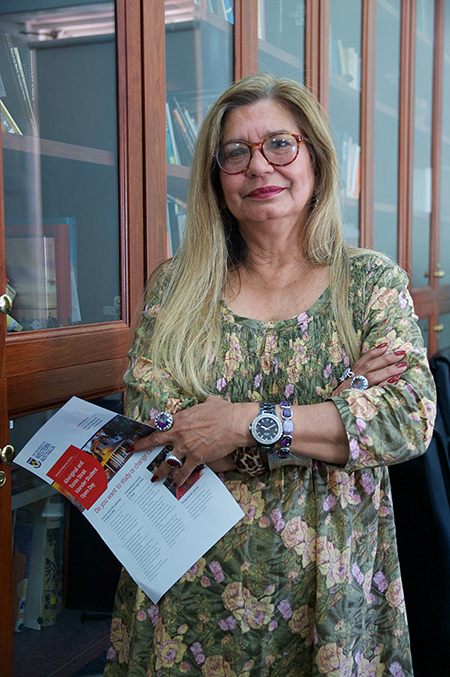The suicide epidemic

I work on a number of projects including the National Empowerment Project and the Aboriginal and Torres Strait Islander Suicide Prevention Evaluation Project. These address Indigenous suicide. Suicide among Aboriginal and Torres Strait Islander peoples is known to be twice as high as in the wider Australian population and there is evidence to suggest that it may be higher still (Australian Institute of Health and Welfare, 2014, 2015).
Suicide is one of the most common causes of death among Aboriginal and Torres Strait Islander peoples, with those between the ages of 15 to 34 at highest risk. For them, suicide is the leading cause of death, accounting for 1 in 3 deaths overall. Suicide is a complex behaviour with many causes. For Aboriginal and Torres Strait Islander peoples, there are specific cultural, historical, and political contributors which require a rethinking of conventional models and assumptions.
Developing a whole-of-community tailored approach
In response to the urgent need to address the high rates of Aboriginal and Torres Strait Islander suicide across Australia, the Aboriginal and Torres Strait Islander Suicide Prevention Evaluation Project (ATSISPEP), a comprehensive national project, was funded through the Department of the Prime Minister and Cabinet.
Project goals included establishing the evidence base about Aboriginal and Torres Strait Islander suicide as well as formally evaluating the effectiveness of existing suicide prevention services nationally.
- A tool to assist funders assess applications for Indigenous suicide prevention programs
- A culturally appropriate tool for communities to assess suicide prevention programs to suit their needs
- Roundtable reports and a final review report
- A national conference
The project was undertaken by the School of Indigenous Studies at UWA, in collaboration with the Telethon Kids Institute and the national Healing Foundation. Preliminary findings indicated that the most effective programs and services are based on a holistic understanding of health and wellbeing for individuals, families, and communities. These successful programs and services also promote recovery and healing from trauma, stress and intergenerational loss; empowering people by helping them regain a sense of control and mastery over their lives; and having local, culturally competent staff who are skilled advisors.
Recognising that there are even more vulnerable groups, the project also held themed topical national roundtables with: Aboriginal and Torres Strait Islander youth; those identifying as lesbian, gay, bisexual, transgender, queer or intersex, (LGBQTI); and those involved in the penal justice system, in particular, those re-entering communities following incarceration.
Racism and the various social and health determinants contribute to a sense of hopelessness for many. Programs must be led by, or partnered with community; and the mental health workforce must include more Indigenous Australians. Community members who have been bereaved through suicide must receive access to the service providers that they need. Poverty, disadvantage, unemployment, racism, lack of housing/overcrowding, trans-generational trauma and issues around incarceration have to be factored in when developing a multidimensional approach to tackling suicide. Also - acknowledging the history of colonisation that has contributed to the present situation.
All roundtable participants emphasised the importance of culture and identity, the need for local leadership in determining problems and finding the solutions. They were concerned that many programs and services were not culturally relevant. Self-determination was needed.
The Inaugural Aboriginal and Torres Strait Islander Suicide Prevention Conference
We were particularly pleased with the inaugural Aboriginal and Torres Strait Islander Suicide Prevention Conference that was held over two full days from May 5th-6th, with preconference workshops and a welcome event on May 4th at the Alice Springs Convention Centre in the Northern Territory. This brought experts and members of the Aboriginal and Torres Strait Islander and general community from across the country to Alice Springs, the heart of the Aboriginal nations. For two days those gathered exchanged learnings, shared lived experience and built knowledge. The majority of attendees were Indigenous and over 367 people attended. Feedback from the community has shown that this was a great success.
About Pat
Professor Pat Dudgeon is from the Bardi people of the Kimberly area in Western Australia. She is a psychologist and Fellow of the Australian Psychological Society and a researcher at UWA’s School of Indigenous Studies. Her area of research includes Indigenous social and emotional wellbeing and suicide prevention.
Amongst many commitments, Professor Dudgeon is a Commissioner of the Australian National Mental Health Commission, deputy chair of the Australian Indigenous Psychologists Association, chair of the National Aboriginal and Torres Strait Islander Leadership in Mental Health and co-chair of the ministerial Aboriginal Torres Strait Islander Mental Health and Suicide Prevention Advisory Group. She is currently the director of the National Empowerment Project: an Indigenous suicide prevention project working with eleven sites in Aboriginal communities across the country; and the Aboriginal and Torres Strait Islander Suicide Prevention Evaluation Project. Her many publications on Indigenous mental health include Working Together Aboriginal and Torres Strait Islander Mental Health and Wellbeing Principals and Practice 2014. Pat is actively involved with the Aboriginal community and is committed to social justice for Indigenous people.